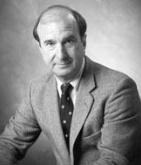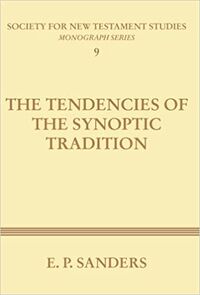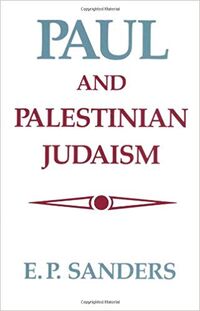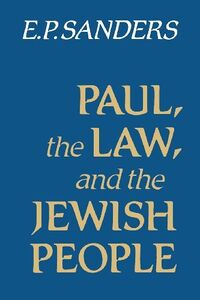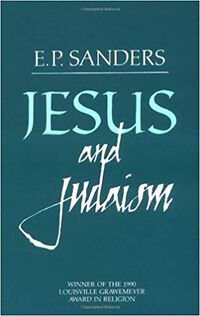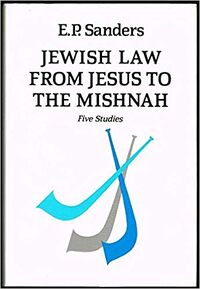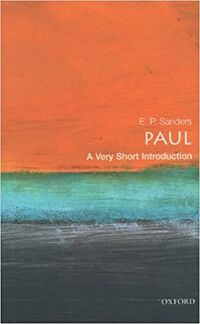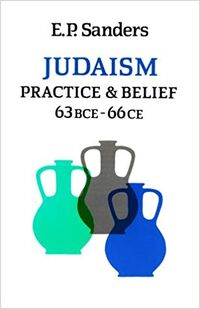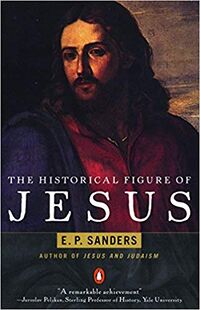Ed Parish Sanders (M / United States, 1937), scholar
(Redirected from Ed Parish Sanders)
Jump to navigation
Jump to search
Ed Parish Sanders (1937-2022) was an American scholar. Professor emeritus at Duke University (Durham, NC). Born in Grand Prairie, Texas into a family of modest means. BA 1959 (Texas Wesleyan College). MA 1962 (Southern Methodist University). ThD 1966 (Union Theological Seminary). Studied modern Hebrew and Rabbinics in Israel. Professor at McMaster University, Canada (1966-1984), and at the University of Oxford, England (1984-1990). Arts and Sciences Professor of Religion at Duke University (1990-2005).
-- 1960s --
E.P. Sanders, The Tendencies of the Synoptic Tradition (Society for New Testament Studies Monograph Series, 9; London [England]: Cambridge University Press, 1969)
- "The Synoptic Gospels contain traditions about Jesus which differ in some respects from Gospel to Gospel and, it is presumed, from the very earliest Christian traditions. Scholars often seek to establish the earliest form of each tradition and the methods and criteria they use are of the greatest importance. Dr Sanders here provides a reassessment of this whole problem. His study deals directly with the question of determining the reliability of the Synoptic Gospels."--Publisher description.
-- 1970s --
E.P.Sanders, Paul and Palestinian Judaism (Philadelphia, PA: Fortress; and London: SCM Press, 1977)
- "Paul and Palestinian Judaism compares Judaism, understood on its own terms, with Paul, understood on his own terms. Sanders aims to: Consider methodologically how to compare two (or more) related but different religions destroy the view of Rabinic Judaism which is still prevalent in much, perhaps most, New Testament scholarship establish a different view of Rabbinic Judaism argue a case concerning Palestinian Judaism as a whole argue for a certain understanding of Paul carry out a comparison of Paul and Palestinian JudaismThis volume makes a contribution not only to the understanding of Paul and his relationship to Judaism, but also to the study of Judaism itself."--Publisher description.
- "In this work Sanders seeks to compare, methodologically, two different systems of religion— namely Palestinian Judaism and Paul— on their own terms. His approach is to analyze the surviving literature for each respective religious system, draw conclusions based on a close reading of that literature, and then compare the two with one another. Throughout the comparative study, Sanders first debunks the predominant opinion of New Testament Scholars of his day that Judaism at the time of Jesus had degraded to a legalistic form of works-righteousness, and proposes instead, that Palestinian Judaism from 200 B.C.E. to 200 A.D. can be understand as “Covenantal Nomism.” After establishing this perspective, Sanders turns to Paul’s religious system and shows that, despite there being several points of convergence between Paul and Palestinian Judaism, since Paul denies the efficacy of the Jewish covenant for salvation he in essence rejects Covenantal Nomism. Thus Sanders concludes that Paul represents an entirely different form of religion that does not have a clear antecedent, but rather is a system that is focused on the meaning of the life and death of Jesus Christ." – Deborah Forger, University of Michigan
- Paulus und das palästinische Judentum (1985 Sanders), book (German ed.)
- Paolo e il giudaismo palestinese (1986 Sanders), book (Italian ed.)
-- 1980s --
E.P. Sanders, Paul, the Law, and the Jewish People (Philadelphia, PA: Fortress, 1983)
- This book is devoted both to the problem of Paul's view of the law as a whole, and to his thought about and relation to his fellow Jews. Building upon his previous study, the critically acclaimed Paul and Palestinian Judaism, E.P. Sanders explores Paul's Jewishness by concentrating on his overall relationship to Jewish tradition and thought. Sanders addresses such topics as Paul's use of scripture, the degree to which he was a practicing Jew during his career as apostle to the Gentiles, and his thoughts about his "kin by race" who did not accept Jesus as the messiah. In short, Paul's thoughts about the law and his own people are re-examined with new awareness and great care. Sanders addresses an important chapter in the history of the emergence of Christianity. Paul's role in that development -- specially in light of Galatians and Romans -- is now re-evaluated in a major way. This book is in fact a significant contribution to the study of the emergent normative self-definition in Judaism and Christianity during the first centuries of the common era.--Publisher description.
E.P. Sanders, Jesus and Judaism (1985 Sanders), book (Philadelphia, PA: Fortress, 1985)
- This work takes up two related questions with regard to Jesus: his intention and his relationship to his contemporaries in Judaism. These questions immediately lead to two others: the reason for his death (did his intention involve an opposition to Judaism which led to death?) and the motivating force behind the rise of Christianity (did the split between the Christian movement and Judaism originate in opposition during Jesus' lifetime?).--Publisher description.
- Gesù e il giudaismo = Jesus and Judaism (1992 Sanders / Stefani), book (Italian ed.)
- 예수와유대교 = Jesus and Judaism (1998 Sanders / Hwang), book (Korean ed.)
- Jesús y el judaísmo (2004 Sanders), book (Spanish ed.)
-- 1990s --
E.P. Sanders, Jewish Law from Jesus to the Mishnah (1990 Sanders), book (London [England]: SCM; and Philadelphia, PA: Trinity International, 1990)
- "A re-examination of first-century Judaism."--Publisher description.
E.P. Sanders, Paul: A Very Short Introduction (1991 Sanders), book (Oxford [England]: Oxford University Press, 1991)
- Paul is the most powerful human personality in the history of the Church. A missionary, theologian, and religious genius, in his epistles he laid the foundations on which later Christian theology was built. In his highly original introduction to Paul's life and thought, E. P. Sanders, whose research on Paul has substantially influenced recent scholarship, pays equal attention to Paul's fundamental convictions and the sometimes convoluted ways in which they were worked out.--Publisher description.
- Paul (1999 Sanders / Yi), book (Korean ed.)
- Paulus: eine Einführung = Paul: A Very Short Introduction (2002 Sanders / Schöller), book (German ed.)
E.P. Sanders, Judaism: Practice and Belief (London, England: SCM Press; and Philadelphia, PA: Trinity International, 1992)
- Working with primary evidence, describes the Judaism of this period as a functioning religion and discusses the religious practice and daily life of ordinary people. Pagan parallels to Jewish practice are noted and common theological ground discussed.--Publisher description (I).
- In this now-classic work, E. P. Sanders argued against prevailing views regarding the Judaism of the Second Temple period, for example, that the Pharisees dominated Jewish Palestine or that the Mishnah offers a description of general practice. In contrast, Sanders carefully shows that what was important was the "common Judaism" of the people with their observances of regular practices and the beliefs that informed them. Sanders discusses early rabbinic legal material not as rules, but as debates within the context of real life. He sets Pharisees, Sadducees, and Essenes in relation to the Judaism of ordinary priests and people. Here then is a remarkably comprehensive presentation of Judaism as a functioning religion: the temple and its routine and festivals; questions of purity, sacrifices, tithes, and taxes; common theology and hopes for the future; and descriptions of the various parties and groups culminating in an examination of the question "who ran what?" Sanders offers a detailed, clear, and well-argued account of all aspects of Jewish religion of the time.--Publisher description (II).
E.P. Sanders, The Historical Figure of Jesus (1993 Sanders), book (London [England]: Penguin, 1993)
- A biography of the historical figure of Jesus. The book studies the relationship between Judaism and Christianity, distinguishing the certain from the improbable, and assessing the historical and religious context of Christ's time. The spread of Christianity is also discussed.--Publisher description.
- Contents : An outline of Jesus' life -- Political setting -- Judaism as a religion -- External sources -- The problems of the primary sources -- Two contexts -- The setting and method of Jesus' ministry -- The beginning of Jesus' ministry -- Miracles -- The coming of the kingdom -- The kingdom : Israel, Gentiles and individuals -- The kingdom : reversal of values and ethical perfectionism -- Contention and opposition in Galilee -- Jesus' view of his role in God's plan -- Jesus' last week -- Epilogue : the resurrection.
- Gesù: la verità storica = The Historical Figure of Jesus (1995 Sanders / Sampaolo), book (Italian ed.)
- Sohn Gottes: eine historische Biographie Jesu = The Historical Figure of Jesus (1996 Sanders / Enderwitz), book (German ed.)
- La figura histórica de Jesús = The Historical Figure of Jesus (2000 Sanders / Tosaus), book (Spanish ed.)
